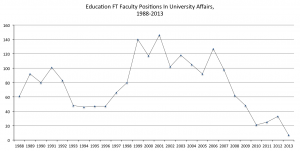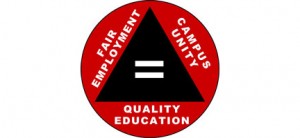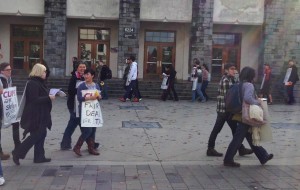Audrey Williams June, Chronicle of Higher Education, February 7, 2014– Maria C. Maisto, president of New Faculty Majority, answered via email select questions submitted by viewers of The Chronicle’s online chat about adjunct issues. The questions and her responses have been edited for brevity and clarity.
Q. Some adjuncts have access to health-care benefits already and don’t need to be covered by the Affordable Care Act. Do you support an exemption so that we could keep our current teaching loads (and paychecks) rather than face colleges cutting our hours so they don’t have to cover us?
A. In this scenario, is the institution getting an exemption from the employer mandate, or is the adjunct with health insurance getting an exemption from having his/her workload reduced? (Don’t like the latter.)
As we indicated in our comments to the IRS, we think that (1) institutions should not be allowed to avoid or circumvent the letter and spirit of the law, namely that no one should be uninsured; (2) educational quality and commitment to the mission of education, particularly as a public good, should be driving institutional response to the ACA, so avoiding excessive course loads is actually a good thing if it is accompanied with the kind of compensation that reflects the real importance of the work. Since these aims can conflict with one another in this context, administrators need to closely collaborate with faculty, with unions, and with students to craft solutions for each individual institution that achieve both aims in a financially sustainable (and legally compliant) way.
Personally I believe with many of my colleagues that fighting for higher course loads may be beneficial for some individuals in the short term but highly problematic for the quality of education and the profession in the long term. I realize that can be hard to face when one has had one’s course load and income reduced, but it’s something that we have to confront honestly as members of the educational profession. And I think it’s reprehensible that so many of our colleagues continue to be forced into positions where their personal economic survival is being pitted against the professional responsibilities to which they have committed as educators.
Q. I don’t think universities will do anything drastic to improve the plight of adjuncts overnight. But what are some ways in which universities can gradually move toward better treatment of adjuncts?
A. Step 1 is to acknowledge the problem—it’s a huge first step. Do a self-study to find out what the conditions actually are on one’s campus and how they compare to conditions locally, regionally, and nationally. The most important aspect of this step is to LISTEN to the contingent faculty on campus (including through anonymous surveys) and to commit to protecting their right to give honest answers—no retaliation allowed. There are good resources at the Delphi Project on the Changing Faculty and Student Success.
Most important: Commit to change and get broad campus and community buy-in. Don’t assume that anyone is not a potential ally. Ground the work in the research and understanding that transforming the working conditions of contingent faculty will benefit students, the campus, and the community in the long run.
Q. What do you say about claims that colleges would have to raise tuition to pay adjuncts more and give them health benefits?
A. I think that’s a scare tactic that has been effectively challenged by the kind of work that the American Association of University Professors has done to analyze the audited financial statements of colleges and universities. Money is there, and faculty and administrators and students should all be working together to put pressure on states to reinvest in higher education. See also Delphi’s “Dispelling the Myths.”
Q. Does New Faculty Majority want colleges to turn adjunct jobs into full-time jobs?
A. NFM believes that part-time faculty, especially those that have been long-serving, should be given first preference for full-time jobs that open up. But we also believe that part time should really mean part time—100 percent pro rata compensation—it should not mean full-time work for less than part-time pay. On this issue we have to be careful to remember that people who need part-time work are often caregivers, especially women, and people with disabilities, so we don’t want to forget about them in our recognition that there is a need for full-time positions and a huge number of people who are willing and able to fill them.
Read More: Chronicle of Higher Ed

 Follow
Follow



